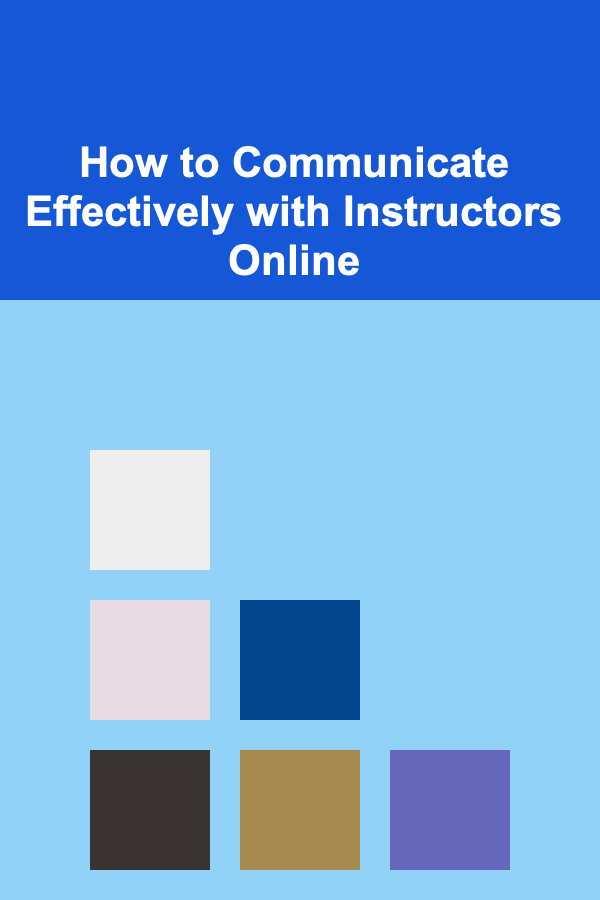
How to Communicate Effectively with Instructors Online
ebook include PDF & Audio bundle (Micro Guide)
$12.99$10.99
Limited Time Offer! Order within the next:

In today's digital age, online learning has become a prevalent mode of education. As students and instructors navigate this virtual landscape, effective communication emerges as a critical skill. Unlike traditional classrooms, where face-to-face interactions facilitate immediate feedback and engagement, online environments demand more intentional and strategic communication methods.
This article explores how students can communicate effectively with their instructors in an online setting. We will delve into the unique characteristics of online learning, the importance of communication, practical strategies, various forms of communication, and how to handle difficult conversations. By equipping students with these skills, we aim to enhance their educational experiences and foster meaningful relationships with their instructors.
Understanding the Online Learning Environment
2.1 Characteristics of Online Learning
Online learning environments possess distinct characteristics that influence communication:
- Flexibility: Students can access materials and interact with instructors at their convenience, making time management crucial.
- Asynchronous vs. Synchronous Learning: Some courses may involve real-time discussions, while others allow students to engage at their own pace.
- Diverse Platforms: Various technologies are used for communication, including Learning Management Systems (LMS), email, forums, and video conferencing tools.
Understanding these features is vital for adapting communication styles to fit the online context.
2.2 Differences Between Online and Traditional Classrooms
While both settings aim for effective teaching and learning, online classrooms differ from traditional ones in several ways:
- Physical Absence: The lack of physical presence can lead to misunderstandings; thus, clarity becomes even more important.
- Varied Interaction Modes: Online communication may include written text, audio, and video, necessitating adaptability from both students and instructors.
- Self-Motivation: Online learners often need stronger self-discipline due to the absence of immediate oversight.
These differences highlight the need for students to develop effective communication strategies tailored to the online environment.
The Importance of Effective Communication
3.1 Building Relationships
Establishing a rapport with instructors can enhance the learning experience. Positive relationships lead to:
- Increased engagement
- Greater willingness to seek help
- A sense of belonging within the educational community
Effective communication serves as the foundation for these relationships, allowing students to express their needs and interests openly.
3.2 Enhancing Learning Outcomes
Clear communication contributes to better academic performance. When students articulate questions or concerns effectively, they are more likely to receive timely assistance and relevant feedback, directly impacting their understanding and retention of material.
Research indicates that students who engage in open dialogue with instructors often experience improved motivation and academic success. Thus, mastering communication skills is not just beneficial; it is essential.
Strategies for Effective Communication
4.1 Be Clear and Concise
One of the most important aspects of communication is clarity. When reaching out to instructors, consider the following:
- Use Simple Language: Avoid jargon or overly complex sentences that could confuse the reader.
- Get to the Point: State your purpose early in the message. For example, if you have a question about an assignment, mention it in the first paragraph.
- Organize Your Thoughts: Use bullet points or numbered lists for clarity when presenting multiple questions or points.
By being clear and concise, you respect your instructor's time and increase the likelihood of receiving a timely response.
4.2 Use Appropriate Tone and Language
The tone of your communication significantly affects how your message is received. To maintain professionalism:
- Be Respectful: Always address instructors formally unless otherwise indicated. Use titles (e.g., Professor, Dr.) and last names.
- Stay Positive: Even when discussing challenges or issues, frame your language positively. Instead of saying "I don't understand this," try "I would appreciate some clarification on this topic."
Your tone should reflect professionalism and a willingness to collaborate, fostering a constructive dialogue.
4.3 Active Listening
Effective communication is a two-way street. Active listening involves fully engaging with the instructor's responses, which can be achieved by:
- Focusing on the Speaker: Avoid distractions during meetings or when reading messages.
- Asking Clarifying Questions: If something is unclear, don't hesitate to ask for more information.
- Summarizing Responses: Paraphrase what the instructor said to confirm your understanding.
Demonstrating active listening not only shows respect but also enhances the overall communication process.
4.4 Utilizing Technology
Various technological tools can facilitate effective communication in an online learning environment:
- Learning Management Systems (LMS): Familiarize yourself with platforms like Blackboard or Canvas, which often have built-in messaging and discussion board features.
- Email Etiquette: Use email for formal communication, ensuring you follow standard conventions (subject line, greeting, body, closing).
- Video Conferencing Tools: Leverage platforms like Zoom or Microsoft Teams for real-time discussions, fostering a more personal connection.
Understanding these tools enables students to choose the most appropriate method for their communication needs.
Types of Communication
5.1 Emails
Email remains a primary communication tool in online education. To craft effective emails:
- Subject Line: Make it descriptive, indicating the email's purpose (e.g., "Question Regarding Assignment Due Date").
- Professional Greeting: Start with "Dear Professor [Last Name]."
- Body Structure: Briefly introduce yourself if necessary, state your question or concern clearly, and conclude with a polite closing.
5.2 Discussion Boards
Discussion boards promote collaborative learning and allow students to interact not only with instructors but also with peers. To excel in this format:
- Engage Actively: Respond to prompts thoughtfully and contribute to ongoing discussions.
- Respect Others' Opinions: Acknowledge classmates' contributions and provide constructive feedback.
- Stay On Topic: Ensure your posts relate to the subject matter to maintain focus.
5.3 Video Conferencing
Video meetings provide opportunities for real-time interaction, making them ideal for more complex discussions. Best practices include:
- Test Technology: Ensure your device and internet connection work before the meeting.
- Dress Appropriately: Treat video calls as you would an in-person meeting.
- Maintain Eye Contact: Look at the camera when speaking to simulate eye contact and create a connection.
5.4 Social Media
Some instructors use social media platforms for informal communication. However, it's vital to maintain professionalism even in these contexts:
- Follow Guidelines: Adhere to any established protocols regarding social media interaction.
- Limit Personal Sharing: Keep discussions focused on course-related content.
Handling Difficult Conversations
6.1 Addressing Conflicts
Conflicts may arise due to misunderstandings or differing expectations. When addressing conflicts:
- Stay Calm: Approach the situation rationally, avoiding emotional reactions.
- Seek Resolution: Express your viewpoint and listen to the instructor's perspective. Collaborate to find a solution.
- Follow Up: After resolving the issue, check in to ensure continued understanding.
6.2 Providing Constructive Feedback
If you feel dissatisfied with instructional methods or course materials, providing feedback can be helpful. To do so effectively:
- Be Specific: Identify particular instances and suggest feasible improvements.
- Remain Professional: Frame your feedback positively, emphasizing your desire for improvement rather than criticism.
6.3 Expressing Concerns
If facing academic difficulties or personal challenges, communicating these issues is crucial. Strategies include:
- Be Honest: Clearly articulate your situation, whether it's academic stress or personal issues affecting your performance.
- Request Support: Inquire about available resources or accommodations, demonstrating your commitment to overcoming obstacles.
Cultural Considerations in Communication
In global online classrooms, cultural differences can impact communication styles. Awareness of these nuances enhances effective interaction:
- Respect Diversity: Understand that students and instructors may have varying communication preferences influenced by their cultural backgrounds.
- Adaptability: Be willing to adjust your communication style to accommodate others' preferences and make them comfortable.
Promoting an inclusive atmosphere enriches the learning experience for everyone involved.
Conclusion
Effective communication with instructors in an online learning environment is paramount for academic success. By understanding the unique characteristics of online learning, employing clear and respectful communication strategies, and navigating various communication forms, students can foster productive relationships with their instructors.
Mastering these skills not only enhances learning outcomes but also prepares students for future professional environments where effective communication is equally vital. Embracing the principles outlined in this article lays the foundation for a rewarding and successful educational journey in the digital age. Through intentional and thoughtful communication, students can unlock the full potential of their online learning experiences.
Reading More From Our Other Websites
- [Organization Tip 101] How to Use Old Jars for Creative Storage Solutions
- [Home Rental Property 101] How to Find Houses for Rent with a Deck: Maximizing Outdoor Space
- [Home Family Activity 101] How to Organize a Family Volunteer Day in Your Community
- [Home Renovating 101] How to Avoid the Most Common Home Renovation Mistakes That Crush Your Budget
- [Reading Habit Tip 101] Rotating Host Tips: Sharing the Spotlight & Responsibilities
- [Home Rental Property 101] How to Make Your Rental Property Pet-Friendly Without the Hassle
- [Reading Habit Tip 101] The Science of Storytelling: Why Reading Soothes the Mind
- [Home Pet Care 101] How to Help Your Pet Adjust to a New Home
- [Home Storage Solution 101] How to Sort and Store Children's Toys to Reduce Clutter
- [Organization Tip 101] How to Create a Cozy Reading Nook in Your Home

How to Create a Checklist for Securing Your Website from SQL Injection Attacks
Read More
How to Design Your Dream Kitchen Without Spending a Fortune
Read More
How to Understand and Use Compound Interest to Your Advantage
Read More
How to Build a Strong Content Library
Read More
How to Integrate Digital Tools into Your Classroom Planner
Read More
How to Build a Language Learning Checklist for Visual Learners
Read MoreOther Products

How to Create a Checklist for Securing Your Website from SQL Injection Attacks
Read More
How to Design Your Dream Kitchen Without Spending a Fortune
Read More
How to Understand and Use Compound Interest to Your Advantage
Read More
How to Build a Strong Content Library
Read More
How to Integrate Digital Tools into Your Classroom Planner
Read More